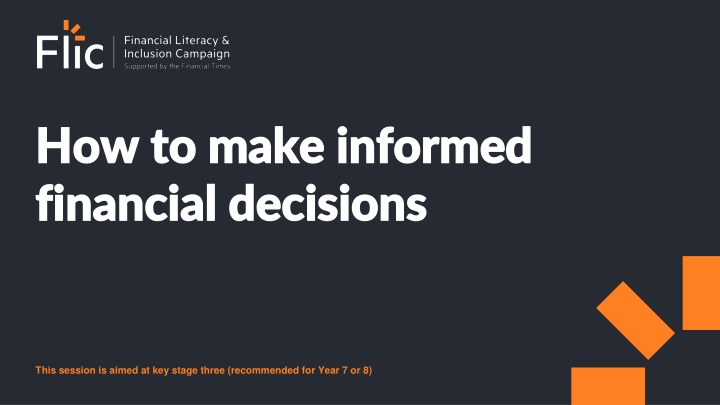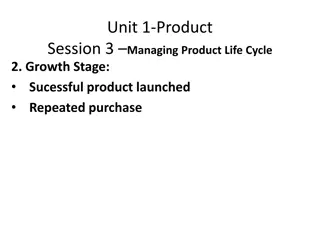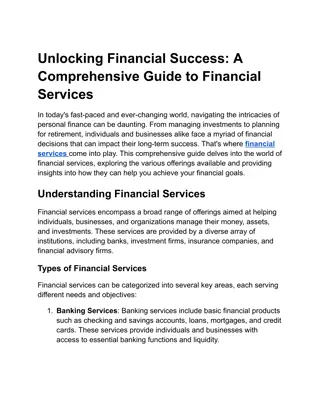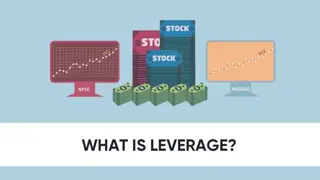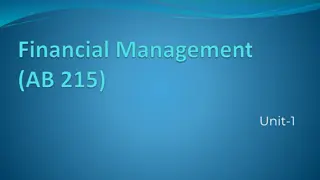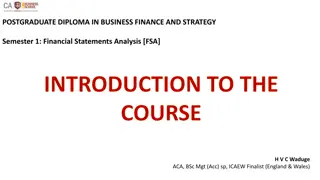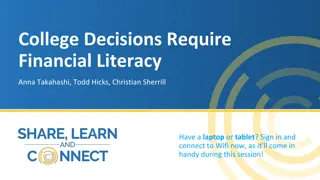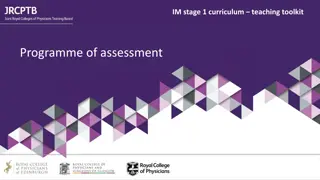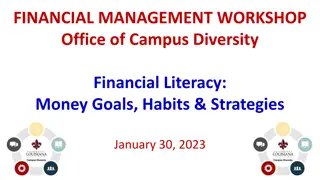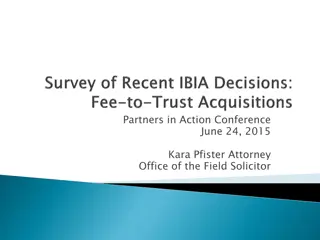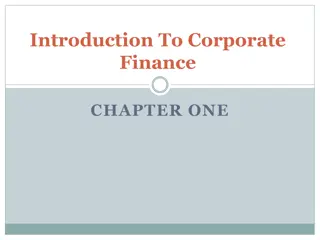Financial Decisions for Key Stage 3
This session for Key Stage 3 students focuses on making informed financial decisions. Topics include saving money, opening a bank account, reading bank statements, using bank cards, managing debt, and understanding the importance of saving for the future. Students will learn practical skills and strategies to manage their finances effectively.
Download Presentation

Please find below an Image/Link to download the presentation.
The content on the website is provided AS IS for your information and personal use only. It may not be sold, licensed, or shared on other websites without obtaining consent from the author.If you encounter any issues during the download, it is possible that the publisher has removed the file from their server.
You are allowed to download the files provided on this website for personal or commercial use, subject to the condition that they are used lawfully. All files are the property of their respective owners.
The content on the website is provided AS IS for your information and personal use only. It may not be sold, licensed, or shared on other websites without obtaining consent from the author.
E N D
Presentation Transcript
How to make informed How to make informed financial decisions financial decisions This session is aimed at key stage three (recommended for Year 7 or 8)
Unit outline 2 Session 1 Session 2 Session 3 Session 4 Session 5 Session 6 How to open a bank account How to read a bank statement How to save money How to use bank cards How to manage debt A guide to banking
Having a respectful learning environment 3 We will listen to each other respectfully We will avoid making judgements or assumptions about others We will comment on what has been said, not the person who has said it We won t put anyone on the spot and we have the right to pass We will not share personal stories or ask personal questions If there is a question that you do not wish to ask aloud, you can write it on a Post-it Note which will be collected throughout the session and answered at the end
44 Session 3 How to save money How to save money
5 By the end of the session, I will be able to: Identify why people need to save money Assess different ways to save Create a savings plan
6 What does saving mean? Saving means money set aside for future use and not spent immediately. How easy is it to save money?
What do people save money for? 7 Which of these items might someone need to save up for? Can you think of any other items? Stretch: Is this the same for all people?
What do people save money for? 8 Write a paragraph explaining why people might need to save money Give examples of what they would save for Describe how this might be different depending on your age, circumstances or beliefs
9 By the end of the session, I will be able to: Identify why people need to save money Assess different ways to save Create a saving plan
How to save on the things you buy 10 Use price comparison sites Look out for cashback offers Find discount codes Meghan Markle recently went viral on social media by saying she never buys anything online without finding a promotion code first. Explore package deals e.g. buying a cinema pass rather than one off tickets Saving Saving when when buying buying Promotion code What other things could you do or look for to save money? Have a one in, one out policy when you buy clothes (and sell or donate the one you re getting rid of) Delayed gratification Buy pre- loved goods
How do people save money? 11 What are the different ways a young person can save money? Where might they keep the money that they save? What are the advantages and disadvantages of each method?
What is interest? 12 Money that is paid as a reward to savers or as a fee on borrowed money Interest Deposits Customers Bank Loans Interest
Smart saving 13 Put money into an account that pays interest (a percentage added to the money in the bank) this might be paid monthly or yearly Be even smarter by using an account that is tax free (ISA Individual Savings Account) so that interest money isn t lost on tax. You have to be 16 to open a cash ISA, but a Junior ISA can be opened by a parent or guardian Savings in a bank account are protected by the Financial Services Compensation Scheme up to the value of 85,000 if anything should happen to your bank, your money is safe
Calculating interest 14 If a customer deposits 100* earning 10% interest: 1. How much interest has she made at the end of the year? 2. How much money in total is in her account at the end of the year? How do we work this out? *Assuming no more money is taken out or deposited over the year
Calculating interest 15 2. How much money in total is in her account at the end of the year? 1.How much interest has she made at the end of the year? We add up the 100 deposit and the interest she makes. 100 + 10 = 110 To find 10% of 100, we calculate 0.10 x 100 = 10
Calculating interest 16 Lucy is choosing to put some money in a savings account. 1. How much interest has she made at the end of the year? She puts money into this account and gains interest on the money that she deposits (puts in). To find 2% of 100, we calculate 0.02 x 100 = 2 2. How much money in total is in her account at the end of the year? If Lucy deposits 100* earning 2% interest: 1. How much interest has she made at the end of the year? 2. How much money in total is in her account at the end of the year? We add up the 100 deposit and the interest she makes. 100 + 2 = 102 *Assuming no more money is taken out or deposited over the year Optional video - watch to learn about compound interest - https://youtu.be/DyXUCEm7VeY
How do people save money? 17 Put money in a cash box Open a savings account Advantages of using this method Disadvantages of using this method Items you would save for using this method?
Answers | How do people save money? 18 Putting money in a cashbox Advantages Disadvantages Immediate access: You have immediate access to your cash without any restrictions or waiting periods. This can be helpful in emergency situations. Privacy: Keeping your money in a cash box provides a higher level of privacy compared to a bank account, as there are no records of your transactions. No interest: Money stored in a cash box doesn't earn any interest or grow over time, resulting in missed opportunities for financial growth. Lack of documentation: Without proper documentation, it can be difficult to prove the source of the funds or their intended use. No Fees: There are no account maintenance fees or minimum balance requirements associated with a cash box, unlike some bank accounts. Security Risks: Cash stored in a box is vulnerable to theft, loss due to fire or natural disasters, and accidental damage. This risk can be significant, especially if you keep a large
Answers | How do people save money? 19 Open a savings account Advantages Disadvantages Security: Banks provide a higher level of security for your money, including protection against theft, fire, and natural disasters. Your funds are also insured up to a certain limit by government-backed programs. on the money you deposit, helping your funds grow over time. While interest rates can vary, it's still a better option for growing your money compared to a cash box. Fees and requirements: Some savings accounts come with fees, minimum balance requirements, and other conditions that can affect your overall returns. It's important to compare different account options before choosing one. Interest Earnings: Savings accounts offer interest Limited access: While savings accounts offer convenient access, there might be limitations on the number of withdrawals or transfers you can make per month without incurring fees. Record Keeping: Banks provide clear records of your transactions, which can be helpful for budgeting, tax purposes, and tracking your financial history. Market fluctuations: The interest rates offered by savings accounts can change over time based on economic conditions, potentially affecting your earnings.
20 By the end of the session, I will be able to: Identify why people need to save money Assess different ways to save Create a saving plan
Saving goal 21 What sort of items would a Year 8 student be saving for?
Saving goal 20 If you set yourself a saving goal, it helps keep your financial decisions focused It s fine to save small amounts, regularly If the saving goal is large, set some interim goals (and maybe some rewards to keep you motivated!) Find a picture to put as your phone background, in your wallet or on your wall to remind you of your goal
Create a saving goal 21 Charlie gets 10 pocket money every week. He spends most of his money on sweets and snacks on his way to school. Charlie s carer says he should think more carefully about how he spends his money. Charlie has decided to save up for a game he really wants. It costs 40. Decide how much money Charlie will save each week. How long will it take Charlie to save for this item? Create some rewards for when smaller amounts of the goal are achieved. Personal reflection: Have you ever saved up for something you needed or wanted to buy?
24 By the end of the session, I will be able to: Identify why people need to save money Assess different methods of saving money Create a saving plan
Things to look out for 23 Minimum deposit there may be a set amount of money needed to open the account Interest rate this can be fixed or variable, meaning it either stays the same or can change Notice periods you may not be able to get your money out instantly, or there ll be a penalty fee if you do Fixed time period the account can only be held for a certain length of time, such as a year
Plan to save 24 Save first! Don t wait until the end of the month to save, as there might not be any money left! Use a saving goal - an item you really want Have an amount in mind to save each month Use a savings calculator, like the one on Moneyhelper.org.uk There are some apps that round up transactions so that small amounts can be saved as a person spends e.g. if you spend 4.35 the app will round it to 5.00 and put the 65p into the savings account
27 How easy is it to save money?
28 Any questions? Any questions? ?
26 Services available for people who have concerns about their personal finances Citizens Advice Debt and Money This resource contains links to advice on a number of topics, including financial difficulties, cost of living and communicating with creditors. Childline Helpline 0800 1111 National Debtline Debt and Money a debt advice charity run by the Money Advice Trust, offering a free and confidential debt advice service. At school, you can speak with an adult you trust. This could be your form tutor, head of year or the school s safeguarding officer.
30 Links to learn more! Articles to extend learning Articles to extend learning Please visit the FLIC learning hub - https://ftflic.com/learning-hub/ for further resources
